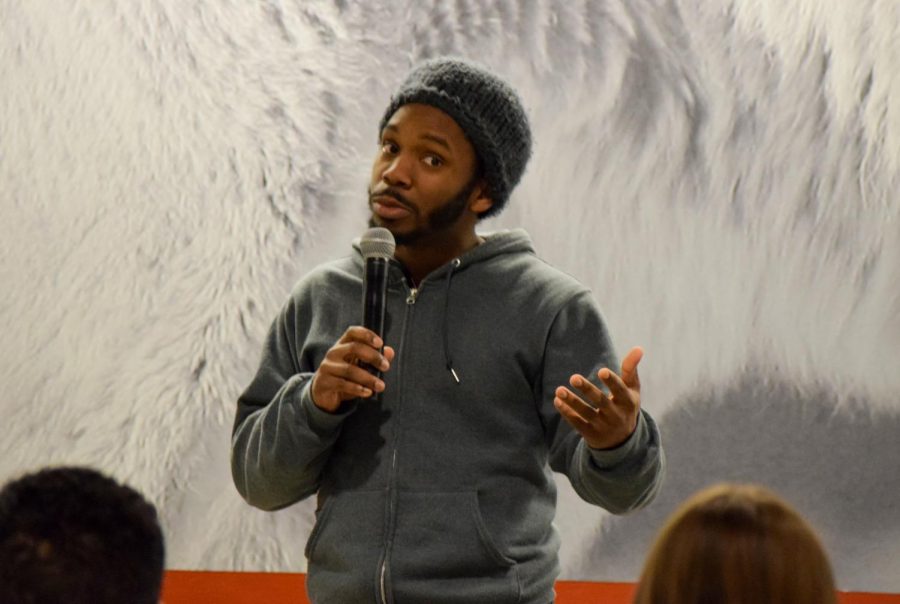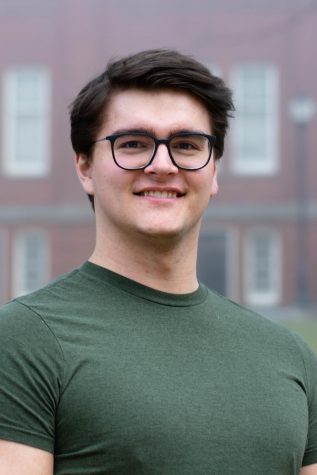Many groups talk, GPSA follows through
Organizations should keep promises they make, offer important resources to students, community
MICHAEL LINDER | DAILY EVERGREEN FILE
GPSA president-elect Amir Gilmore talks at a GPSA meeting.
April 17, 2018
GPSA is one of the most effective student groups on campus because of the resources it provides to its constituents. It sets the standard for every WSU organization.
Due to the difficulties associated with pursuing a graduate degree, GPSA provides critical support for students who have to teach and assist with research on top of their classes.
This semester, they voted to increase the budget for evening childcare, delayed stipend cuts for graduate students in the Voiland College of Engineering and Architecture and worked to secure 90 percent dental coverage for graduate student assistantships.
“Our budget allocation was $575,000 and we really try to make sure that we have direct services for students,” said Amir Gilmore, GPSA vice president and president-elect. “Whether that money is going to the Children’s Center, travel registration grants or research expos.”
GPSA leaders have said one of their main goals is to stretch their funding as far as possible and make sure that everything they’re doing makes a difference for people who depend on them.
Other student groups would benefit from following this philosophy of community empowerment and strategic resource management. By both listening to the needs of their community and then following through on those demands, GPSA has built a program that is respected even outside of WSU.
University of Washington looks to GPSA as an example of how to run a graduate-professional student organization, said Josh Munroe, vice president of legislative affairs.
While that sounds simple, many other organizations refuse to openly acknowledge feedback or don’t do anything with the feedback they receive. Follow-through is a scarce commodity at WSU, with administration failing to act on promises it made following a sit-in last August.
However, every organization has room for improvement. Next year, Gilmore wants to make engagement their first priority.
“It seems like I always meet constituents when there’s a terrible thing, which is our role,” Gilmore said. “But I really want to talk to constituents when things are going well and have those day-to-day conversations about what’s really going on.”
GPSA is different because it is proactive. It tries to get to problems before they happen, rather than just reacting to situations when there is an issue, as many groups seem to do.
Gilmore said they want to get more Registered Student Organization and students from other research locations involved with their programs. This way they can benefit from the S&A fees they might not experience firsthand, like the child-care opportunities. He said next year, leadership plans to make site-visits and try to improve GPSA’s connection with students beyond the Pullman campus.
For those who want to support GPSA, Gilmore said participation is the most important contribution students can make.
“I think for our constituents, feedback is always good for us,” Gilmore said. “I always like to joke that sometimes it gets lonely up here, because we don’t have enough of our constituents stop in and have a conversation with us.”
The success of most of their legislative advocacy events depends on student participation. With events like Coug Day at the Capitol, where students meet with lawmakers to discuss legislation, involvement can directly translate into real change for the situation of students.
Keeping organizations accountable helps GPSA achieve its goals by giving it an added layer of public responsibility. GPSA wasn’t built solely on the aspirations of its members — it was gradually shaped by the careful consideration of community needs, and how those needs can be met.
Other organizations on campus ought to follow GPSA’s lead when it comes to engaging with the community, collecting feedback and making changes accordingly.











